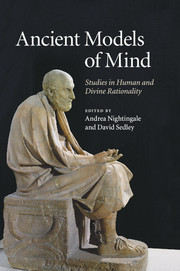Book contents
- Frontmatter
- Contents
- List of contributors
- Introduction
- 1 Plato on aporia and self-knowledge
- 2 Cross-examining happiness: reason and community in Plato's Socratic dialogues
- 3 Inspiration, recollection, and mimēsis in Plato's Phaedrus
- 4 Plato's Theaetetus as an ethical dialogue
- 5 Contemplating divine mind
- 6 Aristotle and the history of skepticism
- 7 Stoic selection: objects, actions, and agents
- 8 Beauty and its relation to goodness in Stoicism
- 9 How dialectical was Stoic dialectic?
- 10 Socrates speaks in Seneca, De vita beata 24–28
- 11 Seneca's Platonism: the soul and its divine origin
- 12 The status of the individual in Plotinus
- A. A. Long: publications 1963–2009
- Bibliography
- Index
1 - Plato on aporia and self-knowledge
Published online by Cambridge University Press: 06 December 2010
- Frontmatter
- Contents
- List of contributors
- Introduction
- 1 Plato on aporia and self-knowledge
- 2 Cross-examining happiness: reason and community in Plato's Socratic dialogues
- 3 Inspiration, recollection, and mimēsis in Plato's Phaedrus
- 4 Plato's Theaetetus as an ethical dialogue
- 5 Contemplating divine mind
- 6 Aristotle and the history of skepticism
- 7 Stoic selection: objects, actions, and agents
- 8 Beauty and its relation to goodness in Stoicism
- 9 How dialectical was Stoic dialectic?
- 10 Socrates speaks in Seneca, De vita beata 24–28
- 11 Seneca's Platonism: the soul and its divine origin
- 12 The status of the individual in Plotinus
- A. A. Long: publications 1963–2009
- Bibliography
- Index
Summary
I am honored to dedicate this essay to my dear friend and mentor, Tony Long. This small offering stands in for my great admiration for this man. I thank Tony for his generosity, his brilliance, and his greatness of soul.
Consider the famous Delphic pronouncement, “know thyself.” In archaic and classical Greece, self-knowledge or sōphrosunē involved an understanding of oneself in relation to others, both human and divine. The man who “knows himself” understands human limits and does not attempt to overstep these boundaries. The sōphrōn knows his place in relation to the gods and understands his station in society. Challenging traditional views, Plato offers new, philosophical “selves” who achieve different modes of self-knowledge. In the early dialogues, Plato portrays a philosopher who comes to know himself even as he seeks for truths that he cannot fully grasp. And, in the middle dialogues, Plato introduces an incorporeal soul that contemplates the Forms and understands itself in relation to these beings. This transmigrating soul, however, is incarnated in a specific person in a given place and time: the incarnated soul shuttles back and forth from a personal life on earth to an impersonal “vision” of higher realities. This “double life” of the soul generates a new kind of self. In these texts, Plato transforms the Greek command to “know thyself.” Long has taught us, the Greek philosophers offered radical reconceptualizations of the “self.” I want to explore the new “selves” that Plato dramatized and conceptualized in his explorations of self-knowledge.
- Type
- Chapter
- Information
- Ancient Models of MindStudies in Human and Divine Rationality, pp. 8 - 26Publisher: Cambridge University PressPrint publication year: 2010
- 4
- Cited by



